12, May 2021
Pope’s joy as he resumes audience with public 0
Pope Francis expressed his pleasure Wednesday at being once again among his flock as he delivered his weekly general audience in public for the first time in six months.
He greeted a baby, signed a book, donned a hat someone gave him and chatted with children who had painted him pictures as the faithful — all in masks, unlike the vaccinated pontiff — lined up to greet him.
“I am happy to resume this face to face because I tell you one thing — it is not nice to talk in front of nothing, in front of a camera,” Francis told them as they sat on socially-distanced chairs to listen to his audience in the San Damaso Courtyard at the Vatican.
The pope abandoned his Wednesday public audiences when coronavirus swept across Italy early last year, instead delivering them via video link from the Apostolic Library.
They resumed in September and October — not in St Peter’s Square but in the courtyard with a limited crowd of 500 — only to stop once again due to a fresh wave of infections.
The courtyard was not full Wednesday, but the 300 or so people who came expressed their joy at seeing the pope up close.
There was a cheer when he arrived inside the courtyard in a blue Ford. “Pope Francis, we’re with you!” they shouted, standing on chairs to get a better view as he passed by.
“It was lovely, to see him so close — he wasn’t in a hurry, he took his time,” said a nun from Rome who gave her name as Helene.
“He was happy to be with the people.”
Thomas Viallon, 34, from Paris, added: “It was the first time weve seen the pope. We were really close. He seemed very close to the people.”
Source: AFP

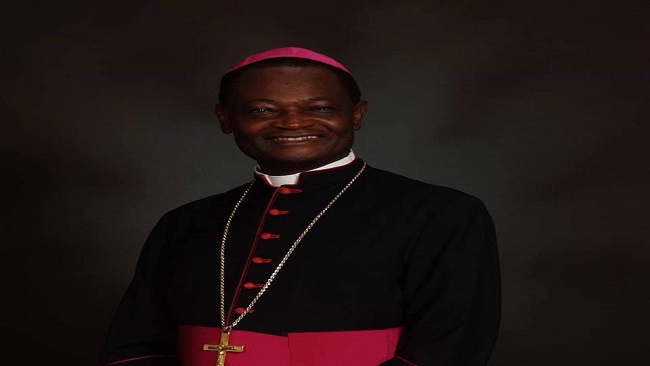
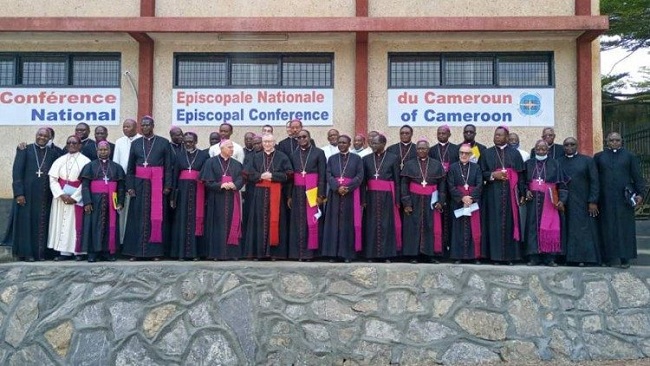
 The conflict had erupted in Cameroon’s Northwest and Southwest regions earlier in 2017 when protests against new government-appointed judges in the regions turned violent. As government forces responded with lethal force, tensions mounted and many English speakers in the predominantly French-speaking country started asking for independence. The ensuing conflict between separatist fighters and government forces has killed at least 3,000 civilians, according to Human Rights Watch. The Internal Displacement Monitoring Centre estimates that at least 460,000 have been forced to flee the affected areas, with tens of thousands seeking refuge in neighboring Nigeria. The Catholic bishops said the government has been too violent in its response to those seeking to form an English-speaking state. Esua said Biya’s 2017 pledge effectively made clear that “anybody who identified himself with the Anglophone cause was considered a terrorist.” After two years of fighting between the two sides, Biya called for a one-week “Major National Dialogue,” held Sept. 30-Oct. 4, 2019. However, the president said the dialogue would not only consider the insurgency but also “issues of national interest such as national unity, national integration and living together.” Bishop George Nkuo, who has headed the Kumbo Diocese in the Northwest Region since 2006, said that approach was wrong because it didn’t address the urgency of the Anglophone problem. Nkuo said the forum should have been used to discuss the Anglophone problem and not all the problems of the nation. He said it was necessary to use that dialogue to revisit the root causes of the conflict as the only possible way of bringing forth a sustainable solution. And the causes of the problem, he said, are rooted in Cameroon history. Initially colonized by Germany in 1884, Cameroon would be divided between Britain and France after the defeat of the Germans in World War I. Britain got one-fifth of the formerly German territory, which it administered as part of Nigeria until 1961 — when through a plebiscite, the British Southern Cameroons (as the British administered entity of Cameroon was then called) voted to reunite with the part formerly administered by France (which had gained its independence in 1960). The two entities went into a federal structure of government, with each entity allowed to freely run its affairs in line with the systems inherited from the colonial powers. But in recent years, some people in the English-speaking regions had accused the central government of trying to quash their traditions.
The conflict had erupted in Cameroon’s Northwest and Southwest regions earlier in 2017 when protests against new government-appointed judges in the regions turned violent. As government forces responded with lethal force, tensions mounted and many English speakers in the predominantly French-speaking country started asking for independence. The ensuing conflict between separatist fighters and government forces has killed at least 3,000 civilians, according to Human Rights Watch. The Internal Displacement Monitoring Centre estimates that at least 460,000 have been forced to flee the affected areas, with tens of thousands seeking refuge in neighboring Nigeria. The Catholic bishops said the government has been too violent in its response to those seeking to form an English-speaking state. Esua said Biya’s 2017 pledge effectively made clear that “anybody who identified himself with the Anglophone cause was considered a terrorist.” After two years of fighting between the two sides, Biya called for a one-week “Major National Dialogue,” held Sept. 30-Oct. 4, 2019. However, the president said the dialogue would not only consider the insurgency but also “issues of national interest such as national unity, national integration and living together.” Bishop George Nkuo, who has headed the Kumbo Diocese in the Northwest Region since 2006, said that approach was wrong because it didn’t address the urgency of the Anglophone problem. Nkuo said the forum should have been used to discuss the Anglophone problem and not all the problems of the nation. He said it was necessary to use that dialogue to revisit the root causes of the conflict as the only possible way of bringing forth a sustainable solution. And the causes of the problem, he said, are rooted in Cameroon history. Initially colonized by Germany in 1884, Cameroon would be divided between Britain and France after the defeat of the Germans in World War I. Britain got one-fifth of the formerly German territory, which it administered as part of Nigeria until 1961 — when through a plebiscite, the British Southern Cameroons (as the British administered entity of Cameroon was then called) voted to reunite with the part formerly administered by France (which had gained its independence in 1960). The two entities went into a federal structure of government, with each entity allowed to freely run its affairs in line with the systems inherited from the colonial powers. But in recent years, some people in the English-speaking regions had accused the central government of trying to quash their traditions. A view of the Catholic cathedral of Kumbo, in Cameroon’s English-speaking Northwest Region In 2016, four Catholic bishops in the English-speaking regions accused Biya’s government of trying to strangle their culture. “Anglophone Cameroonians are slowly being asphyxiated as every element of their culture is systematically targeted and absorbed into the Francophone Cameroon culture and way of doing things,” they wrote at the time. Nkuo said the 2019 dialogue should have revisited these historical perspectives to come up with the right answers to the problem. The current archbishop of Bamenda, Andrew Nkea Fuanya, criticized the format of the dialogue, saying it didn’t involve the appropriate representatives of the English-speaking regions. “That wasn’t a dialogue at all,” Fuanya told NCR. Esua was invited to participate in the dialogue. “To be frank, it was a monologue,” he said. “In a dialogue, you take two people to dialogue. And in a dialogue, you have different opinions. You have to listen to the other person and the other person listens to you, and gradually you come to an agreement.” “Ninety percent of the participants at the National Dialogue were all government people, or people with government allegiance, but the real persons with whom you had to dialogue were not there,” said Esua. Separatist leaders weren’t part of the dialogue. Sesseku Ayuk Tabe, the recognized leader of the movement to form a new country of Ambazonia, was arrested in 2018 and is now serving a life sentence. “You couldn’t talk of a dialogue if these people weren’t there,” Esua said of the separatist leaders’ absence at the negotiating table. Nevertheless, the dialogue came up with a number of recommendations, including the adoption of a special status for the two Anglophone regions, the immediate relaunch of certain airport and seaport projects in the regions, the rapid integration of ex-combatants into society, and a hastening of decentralization of power away from the central government.
A view of the Catholic cathedral of Kumbo, in Cameroon’s English-speaking Northwest Region In 2016, four Catholic bishops in the English-speaking regions accused Biya’s government of trying to strangle their culture. “Anglophone Cameroonians are slowly being asphyxiated as every element of their culture is systematically targeted and absorbed into the Francophone Cameroon culture and way of doing things,” they wrote at the time. Nkuo said the 2019 dialogue should have revisited these historical perspectives to come up with the right answers to the problem. The current archbishop of Bamenda, Andrew Nkea Fuanya, criticized the format of the dialogue, saying it didn’t involve the appropriate representatives of the English-speaking regions. “That wasn’t a dialogue at all,” Fuanya told NCR. Esua was invited to participate in the dialogue. “To be frank, it was a monologue,” he said. “In a dialogue, you take two people to dialogue. And in a dialogue, you have different opinions. You have to listen to the other person and the other person listens to you, and gradually you come to an agreement.” “Ninety percent of the participants at the National Dialogue were all government people, or people with government allegiance, but the real persons with whom you had to dialogue were not there,” said Esua. Separatist leaders weren’t part of the dialogue. Sesseku Ayuk Tabe, the recognized leader of the movement to form a new country of Ambazonia, was arrested in 2018 and is now serving a life sentence. “You couldn’t talk of a dialogue if these people weren’t there,” Esua said of the separatist leaders’ absence at the negotiating table. Nevertheless, the dialogue came up with a number of recommendations, including the adoption of a special status for the two Anglophone regions, the immediate relaunch of certain airport and seaport projects in the regions, the rapid integration of ex-combatants into society, and a hastening of decentralization of power away from the central government.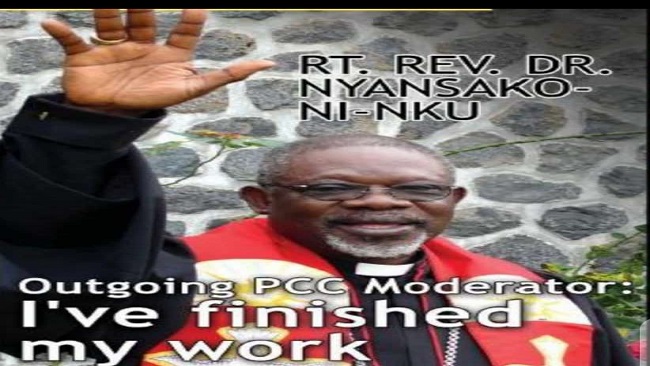
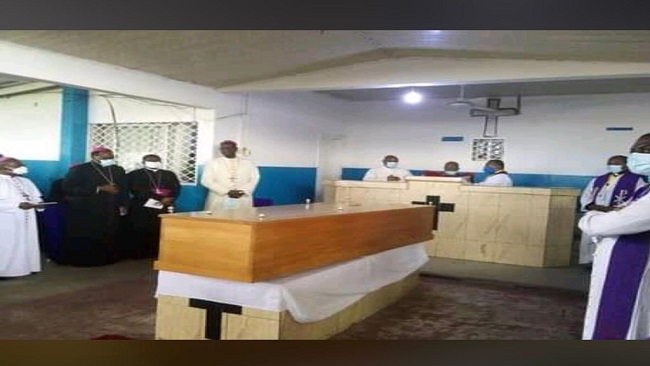

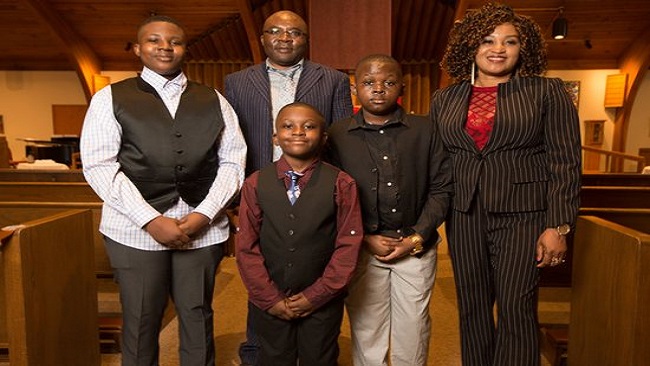

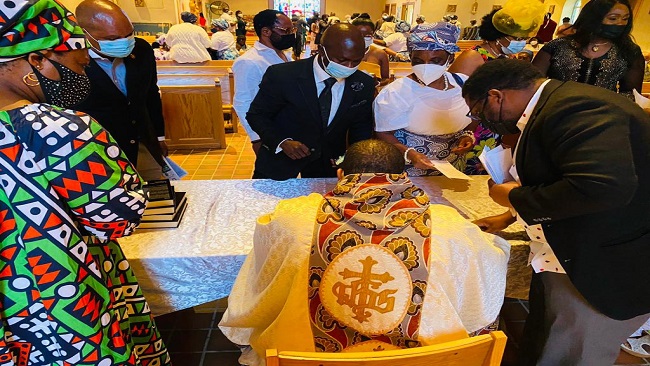
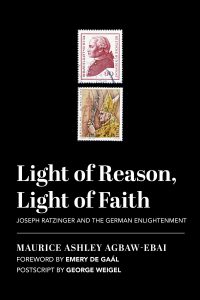
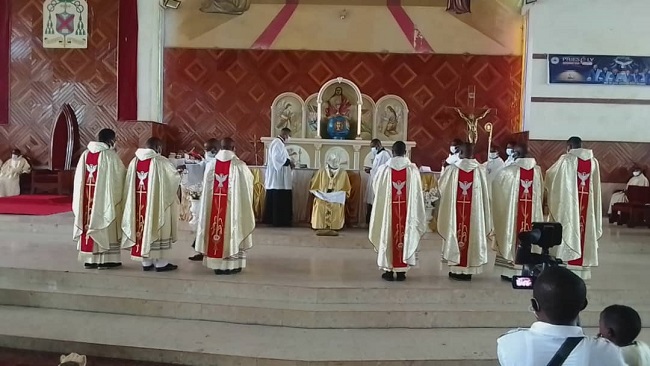

















26, May 2021
Southern Cameroons Crisis: A priest gets kidnapped 0
A priest of the diocese of Mamfe in the Southwest region of Cameroon has been kidnapped as the fighting in Southern Cameroons rages on and enters a critical phase.
Father Christopher Eboka was taken away by unknown gunmen on Friday, May 21, 2021 who have requested a huge ransom from the diocese. The kidnapping of members of the clergy is unfortunate and this underscores the need for all the factions involved in the conflict to seek ways of reaching a peaceful resolution.
The Cameroon Concord News Group correspondent in Mbonge has spoken with Father Christopher’s mother who is very devastated and is urging those responsible for the priest’s kidnapping to release him so that he can continue with the great job he has been doing.
Kidnapping a priest is not only despicable, it is the height of irresponsibility and the Cameroon Concord News Group is joining its voice to that of the mother of father Christopher Eboka to urge the kidnappers to release the man of God.
Those who kidnap men of God are crossing a dangerous red line and this must be condemned by all god-fearing Cameroonians.
The clergy in the two English-speaking regions of the country has been playing a significant role since the Southern Cameroons crisis started in 2016 with the objective of engineering a lasting peace in the two English-speaking regions of the country and to help alleviate the suffering of the population.
Over the last two weeks, the fighting in Cameroon’s two English-speaking regions of the country had escalated, with army soldiers taking huge casualties.
Southern Cameroonian fighters who started out with dane guns have morphed into manufacturers of effective Improvised Explosive Devices (IEDs) which are sending many army soldiers to an early grave.
While the army soldiers have been brutal and successful in outgunning Southern Cameroonian fighters due to their superior weaponry, the use of IEDs by Southern Cameroonian fighters over the last year has left the government in an unfortunate quandary.
In the country’s northwest region where the fighting is escalating on a daily basis, the IEDs have been going off every day and many uniformed officers have not had the luck to return to their families.
The military has lost many of its fighting equipment and these new strategy developed by the Southern Cameroonian fighters has left many army soldiers with tones of butterflies in their stomachs.
The morale among the soldiers is down and many of them, especially those who have been to the battlefield, understand that this war will never be won on the battlefield, as Southern Cameroonian fighters have become deadlier and more determined to push the military out of Southern Cameroons.
Many of the young soldiers are from poor backgrounds and they need the salary from the military, but their belief in a conclusive military victory is diminishing on a daily basis as news of their wounded and dead colleagues spreads across the country like wildlife.
Many of those army soldiers would jump at any opportunity that would get them out of the military, but Cameroon is a country that is bereft of jobs and opportunities. The young soldiers are now caught between the rock and a hard place.
If they refuse to go to Southern Cameroons where Southern Cameroonian fighters are delivering death to many soldiers for free, they will end up in jail for a long time. If they head to Southern Cameroons, they are sure they will not be coming back to East Cameroon, or if they must return, it will either be in a body bag or with debilitating injuries that will make entirely dependent on their family members.
The situation in Southern Cameroons is dire. The world has to wake up from its sleep. The fighting in that part of the country has escalated and very many young Cameroonians are losing their lives because a government ruled by old and ailing leaders is still seeing negotiations as a weakness.
If the world does not stand up against the brutality playing out in Southern Cameroons now, it will one day regret its decision, as many young lives are being wasted due to the inflated ego of people who have prioritized war over peace.
By Soter Tarh Agbaw-Ebai